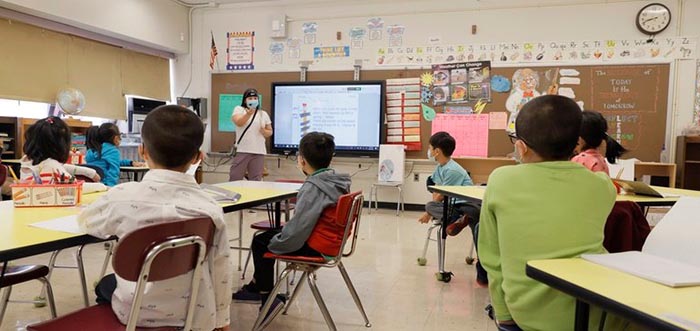
From K-12 Dive
By Kara Arundel
Feb. 16, 2022
Dive Brief:
School and district leaders have a more optimistic view of curriculum quality than do teachers, informational technology staff and curriculum leads, according to a survey conducted by Kiddom, a company that provides digital curriculum and curriculum management.
School and district leaders have a wider lens for curriculum implementation but are distanced from the day-to-day application, which is why they may have a different perspective from other staff. School and district leaders also gave more positive feedback for curriculum fidelity, survey results found.
As schools emerge from pandemic emergency mode, educators in various roles and departments, including teachers, should use their curriculum experiences from the past two years to determine which aspects of digital instruction were effective and what needs improvement, the report recommends.
Dive Insight:
Specifically, the report advises educators to consider how they are measuring the quality and fidelity of both traditional and digital curriculum, as well as curriculum implementation and effects on student outcomes.
Knowledge of a school or district’s curriculum experiences before and during the pandemic, including how the curriculum is used in classrooms, can help guide reform efforts that improve student engagement and mastery of skills, said Abbas Manjee, Kiddom co-founder and chief academic officer.
“The more you can implement a curriculum with fidelity, the more you can better understand what this curriculum does that moves the needle for student achievement,” Manjee said.
First, educators should agree on what digital curriculum is and is not, said Manjee, who says digital curriculum is inherently interactive — and is not downloadable documents.
The expansion of open educational resources, which are free and in the public domain, led to the need to examine these materials for rigor and student accessibility even before the pandemic, he said.
What the pandemic’s early months did was put teachers closer to the curriculum decision-making process as schools closed for in-person learning, and teachers shared lessons and resources with each other to support their virtual instruction.
Although 99.2% of schools are now operating full-time in-person, the widespread experience with remote learning and digital tools will have a lasting impact on curriculum’s adaptation for classroom use, according to a survey last year by Bay View Analytics.
As school systems look to improve the quality of their curriculum, leaders should consider how to include teachers in the research and decision-making process, the Kiddom report recommends.
The Kiddom survey found 27.3% of teachers are involved in curriculum research, and 7.1% in final decision-making. More than half of district-level directors (55%) are involved in final decision-making, as were 27.6% of principals and 28.8% of superintendents.
Teachers said student engagement is the most important factor when choosing a curriculum. School leaders, however, rated standards alignment as the top factor.
“Teachers know their students best,” Manjee said. “Teachers know the content because they are exposed to it every day. It makes sense to involve them early on so you don’t run into an issue where you bought something that gets underutilized.”
Photo: Michael Loccisano via Getty Images
Read this and other stories at K-12 Dive

